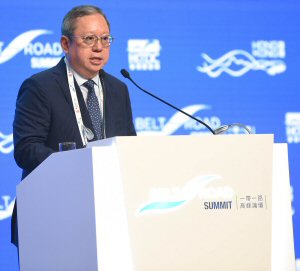
Hong Kong has been braving various issues over the past two years, from the Mainland China-United States trade dispute to the novel coronavirus. These pressures come from many directions but all have one result in common – they rewire the global supply-chain network. This rewiring poses an especially stiff challenge to small and medium enterprises (SMEs) in Hong Kong, which are directly exposed to the fast-evolving global economic and trade environment. These SMEs are not adrift and alone, however. A raft of support tools are at hand to provide support and assistance, including from the Hong Kong Trade Development Council (HKTDC).HKTDC Chairman Dr Peter K N Lam said Hong Kong’s economic outlook – already subdued because of the ongoing Sino-US trade dispute, the weak global economy and the local social unrest over the past months – could come under heavy pressure from the coronavirus outbreak, further weakening demand in retail and catering and affecting the job market in the first half of this year.
Fortune favours the agile
While authorities are limiting people-to-people contact to curb the epidemic, Dr Lam said the HKTDC is using a range of communications technologies and electronic platforms to maintain its support for SMEs, as well as rescheduling or reformatting major events [health protection measures] to help companies capture opportunities. “If the situation improves by mid-year, we will step up our efforts in the second half of the year to help SMEs capture opportunities and diversify their business,” he said.Dr Lam said that when the corona virus situation improves and the economy in the mainland can resume its pace of growth, Hong Kong companies can tap into the mainland market through the Guangdong-Hong Kong-Macao Greater Bay Area Development. They can also take advantage of preferential policies to expand into markets that have free trade agreements with Hong Kong, such as the Association of Southeast Asian Nations (ASEAN) bloc, the European Free Trade Association (Iceland, Switzerland, Norway and Liechtenstein), Australia, New Zealand, Georgia and Chile.Dr Lam urged Hong Kong companies to use resources provided by the Hong Kong Special Administrative Region (HKSAR) Government to diversify their business. These resources [fresh boosts] include special funding for SMEs, various support measures, and services provided by the HKTDC and other public organisations. The HKTDC will continue to help local companies tap into Belt and Road Initiative markets and assist them to relocate manufacturing bases to economic zones and trade parks overseas.
SME transformation

Financial backing
The Hong Kong Monetary Authority (HKMA) has noted that many financial institutions in the city plan to roll out temporary relief measures to help tide their customers the coronavirus outbreak, recognising the impact on both individuals and businesses, especially SMEs. The HKMA convened a special teleconference of the Banking Sector SME Lending Coordination Mechanism on 11 February to discuss ways for the industry to extend greater support to their SME customers in light of the latest developments.The HKMA established the Banking Sector SME Lending Coordination Mechanism in October last year to consolidate the industry’s support for SMEs. A series of supportive measures have already been rolled out.Participating banks agreed that the outbreak has resulted in a further wave of difficulties for SMEs, whose cash-flow pressures have increased significantly. Of the participating banks, eight have already introduced measures to support SMEs in response to an earlier call of the HKMA. The remaining two participating banks will launch similar measures shortly. The Coordination Mechanism also noted that some non-participating banks have responded to the HKMA’s call by proposing various measures to help their customers ride out this difficult time.In order to reduce the cash-flow pressures facing SMEs, banks continue to proactively offer to delay repayments or extend loan tenors, and to reduce fees. Some banks also provide unsecured loan products for SMEs to help improve their cash flow and made special arrangements to expedite loan approvals.Banks have also introduced relief measures targeting specific sectors, the HKMA said. For the import and export sector, banks have extended the repayment period of trade financing facilities to align with the prolonged trade cycle as a result of the outbreak and allowed customers to convert trade financing lines into temporary overdraft facilities so SMEs can manage their cash flow more flexibly. For the transport sector, banks have offered repayment holidays or principal moratoriums to some affected customers, including taxi and minibus operators, to help them overcome this difficult period.The Coordination Mechanism also took the opportunity to discuss how banks can help their retail customers. All participating banks have introduced or will shortly introduce measures to relieve personal financial difficulties. These include principal moratoriums for residential mortgages and fee reductions for credit card borrowing. Regarding principal moratoriums for residential mortgages, the HKMA stated at the meeting that while banks should adhere to the supervisory requirement that mortgage loan tenors should not exceed 30 years in normal circumstances, banks may exercise flexibility on a case-by-case basis for customers with special needs.The Coordination Mechanism will continue to closely monitor developments and discuss with banks other appropriate measures to support SME customers should the need arise.
Resilient hub
Underlining the city’s fundamental strengths as a hub for business and finance, HKSAR Financial Secretary Paul Chan (main picture, at centre), told the Asian Financial Forum last month that the strengths of Hong Kong as a global financial centre were underpinned by its solid linked exchange rate system, its fully convertible currency and the free flow of capital enshrined in the Basic Law, the city’s mini-constitution.Mr Chan said Hong Kong's capital markets are deep and liquid, the exchange rate remains stable and the banking system continues to run smoothly with ample liquidity, reflecting the integrity of the city's financial system and the confidence it conveys even in face of challenges.“We offer businesses from Mainland China and all over the world - more than 9,000 at last count - a level-playing field, a competitive market, whatever their businesses, whatever their investments. Our linked exchange rate system remains solid, our currency fully convertible and capital flowing in and out freely,” he said.
Related link
Hong Kong Trade Development Council

